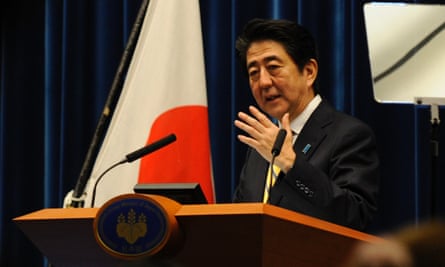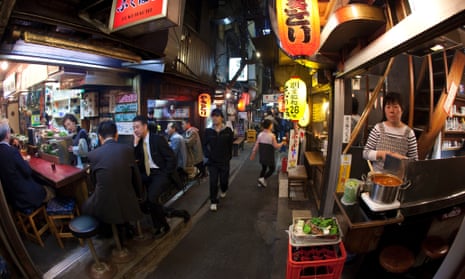The neon flickers into action, bathing the central district of Shinbashi in light. Giant screens blare out ads for electronic gadgets and energy drinks. High above street level, trains arrive every couple of minutes and deposit hordes of office workers on to Shinbashi’s narrow back streets in search of grilled chicken skewers and beer, and the chance to take stock of an extraordinary week for the world’s third-biggest economy.
If the buzz of activity in Shinbashi – packed with offices, bars and restaurants – is any indication, this does not look like a country in recession. But the Friday evening feelgood factor is at odds with the hard data. Last Monday Japan’s government caught almost everyone off guard when it announced that, after a second consecutive contraction in quarterly GDP, the economy was officially back in recession for the first time since 2012. Put simply, Japan’s consumers have stopped spending. Exhibiting the same caution that consigned their economy to more than two decades of stagnation, their thrift threatens to derail prime minister Shinzo Abe’s inflation-led mission to revive the economy.
The news had barely sunk in when Abe announced that a rise in sales tax, from 8% to 10%, that was due to go into effect next October would be delayed until April 2017. A three-percentage-point rise in the same tax last April was widely blamed for battering consumer spending, the driving force behind 60% of the economy, and raising the spectre of deflation and recession.
For now, the clamour at home and abroad for Japan to use the extra tax revenue to tackle its public debt – now worth 230% of GPD – and pay for rising health and social security costs is being drowned out by Abe’s mantra of growth.
On Friday evening, office workers with one eye on the clock were interrupted by their prime minister, who appeared on TV to explain his decision, just hours earlier, to dissolve parliament and call an election for next month. The 14 December poll, he said, would be a referendum on the three “arrows” of his economic policy: monetary easing, fiscal stimulus and structural reform. “This dissolution is an Abenomics dissolution,” he said. “It’s an election that is asking voters whether to continue with Abenomics, or to put a stop to it.”
Among the groups of workers manoeuvring for elbow room at a standing bar in Shinbashi, the sake fumes blended with resignation about the economy and incredulity that they would have to vote again, just two years after Abe took office.
“Have you any idea how much it costs to hold an election?” asks Miki Takahashi, an office clerk who concedes she has been emboldened by a few glasses of sake. “It’s ridiculously expensive, and it’s taxpayers like us who have to pay for it. I want Abe to give us our money back.”

While investors and major exporters have gained from Abe’s early success in boosting the stock market and weakening the yen, employees of Japan’s myriad small and medium-sized firms say the benefits have yet to trickle down in the form of wage rises and job security.
Among those hit hardest is the rapidly expanding underclass of temporary workers, their contracts stripped of the benefits enjoyed by their counterparts during the postwar era of breakneck growth: jobs for life, incremental pay rises and seniority-based promotions. This summer, the labour ministry said, a record high of one in six Japanese lived in relative poverty due to falling incomes in families with young children and the rise of poorly paid, irregular jobs.
Izumi Oba, a 50-year-old office worker on a temporary contract, has no winter bonus to look forward to and a modest salary that barely covers her rent and bills. “It’s a good job I live alone, as I can just about survive on my salary,” Oba says. “Friends of mine with families are having a much harder time.”
Abe knows that next month’s election is far less of a gamble than his record-low approval ratings might suggest. The recent resignations of two ministers over alleged funding and election-law violations were unwelcome reminders of his brief, scandal-plagued stint as leader in 2006-07. But voters sceptical of his claim that there is “no alternative” to Abenomics say they have nowhere to turn to register their protest.
The main opposition, the left-of-centre Democratic party of Japan, is still in disarray after its drubbing at the last election two years ago. Major scandals notwithstanding, Abe’s Liberal Democratic party [LDP] and its junior coalition partner will emerge victorious next month, perhaps with a small dent in their two-thirds majority in the lower house.
So why call an election now? It’s a question voters are struggling to answer. In a recent poll just 18% of respondents approved of Abe’s decision to call a snap election, while 62% opposed it. And despite Abe’s “back me or sack me” histrionics, last week’s disappointing GDP figures did not sound the death knell of his economic policy.
“Judging Abenomics on a quarterly basis does not make much sense,” said Martin Schulz, chief economist at the Fujitsu Research Institute in Tokyo. “The data were poor because the economy is taking time to recover after the sales tax hike in April. Declaring Abenomics a failure because of the recent GDP figures would only work if you are a strong believer in monetary miracles.”
Many suspect that Abe’s decision to go to the country has precious little to do with the (albeit delayed) inevitability of a tax increase. In the first half of next year Japan will confront two of the most divisive policy issues of recent times. Almost four years after the triple meltdown in Fukushima, Abe is lobbying hard for the restart of two nuclear reactors in the country’s south-west, even though more than 50% of Japanese oppose immediate restarts.
He will also attempt to push through legislation to overturn Japan’s constitutional ban on collective self-defence, enabling its troops to fight overseas in the defence of allies – most likely the US – for the first time since the end of the second world war.
After opinion polls showed that the public did not share his enthusiasm for changing the wording of Japan’s pacifist constitution, Abe has opted instead to reinterpret the meaning of its Article 9, which forbids the use of force to settle international disputes.
“All the talk is of tax and the economy,” says Masahiro Tani, a retired IT consultant and a regular visitor to Shinbashi. “No one is saying anything about the constitution, but what could possibly be more important than peace? Next year Abe will be able to claim that we support his plans to change the constitution. By delaying the tax rise, it’s like he’s offered us delicious beef and then added a few other ingredients on the sly.”
With his party’s re-election practically a formality next month, Abe will try to claim an all-encompassing mandate for his rightwing agenda, said Koichi Nakano, a political science professor at Sophia University in Tokyo. “Most people consider the decision as self-serving on Abe’s part,” he said. “He’s trying to bribe the electorate with a delay of the tax increase in the hope that the trickledown effect will come in due course.
“And if he wins substantially, it is quite possible that he will feel comfortable and complacent and focus again on his nationalist agenda rather than the economy.”
At the standing bar, Tani, a striking figure in his dark-blue kimono and a trilby, puts down his drink, pauses, and recalls the time he spent working abroad. “Japan has become like Singapore,” he says. “It’s a democracy where you have a choice … of one. We get the politicians we deserve, but in a democracy we have to exercise our right to vote. I always go to the polling station, but the question is, is there anyone I really want to vote for this time? At this point all I know is that I won’t be voting for the LDP.”

Comments (…)
Sign in or create your Guardian account to join the discussion